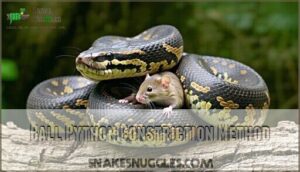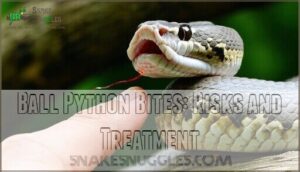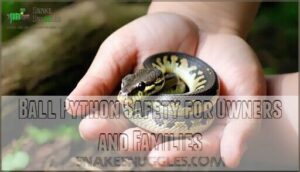This site is supported by our readers. We may earn a commission, at no cost to you, if you purchase through links.

If a ball python bites you, it’s like getting a small puncture wound – no poison enters your system. The main health concern is basic hygiene since they can carry bacteria like Salmonella. That’s why washing your hands after handling is smart practice.
Their docile nature and non-toxic bite make ball pythons popular beginner pets. Understanding proper handling techniques and recognizing stress signals can make your experience even safer.
Table Of Contents
- Key Takeaways
- Are Ball Pythons Poisonous or Venomous?
- How Ball Pythons Catch and Kill Prey
- Ball Python Bites: Risks and Treatment
- Ball Python Safety for Owners and Families
- Common Myths About Ball Pythons
- Ball Pythons as Pets: Pros and Cons
- Health and Disease Concerns in Ball Pythons
- Frequently Asked Questions (FAQs)
- Are ball pythons venomous?
- Are ball pythons good pets?
- Are ball python bites dangerous?
- Are ball pythons irritable?
- What happens if a ball python bites you?
- Is it safe to touch a ball python?
- Are ball pythons safe pets?
- Is a ball python a friendly snake?
- How big do ball pythons typically grow?
- What do ball pythons eat in the wild?
- Conclusion
Key Takeaways
- You don’t need to worry about toxins – ball pythons aren’t poisonous or venomous and can’t inject harmful substances into your system. If you’re bitten, you’ll only experience small puncture wounds similar to needle pricks – there’s no venom or poison involved. You can safely handle ball pythons as pets since they’re non-venomous constrictors with docile temperaments that rarely bite. * You should wash your hands after handling to prevent bacterial transfer like Salmonella, but there’s no risk of toxic exposure.
Are Ball Pythons Poisonous or Venomous?
You might wonder if your ball python can hurt you with venom or poison. Ball pythons aren’t venomous or poisonous and can’t inject toxins into their prey or handlers.
The Difference Between Poisonous and Venomous
Knowing whether a snake is venomous or poisonous could save your life. Venomous snakes bite and inject toxins through their fangs—think rattlesnakes or cobras. Poisonous animals are toxic when you eat or touch them.
People mix up these terms all the time, but they’re completely different things.
Different venomous snakes pack different types of venom, so doctors need the right antivenom to treat each bite. Nonvenomous snakes don’t have venom glands at all.
Why Ball Pythons Are Not Venomous
Ball pythons lack venom glands entirely. These nonvenomous snakes rely on constriction rather than toxic substances. Their harmless nature stems from their non-toxic biology:
- No venom delivery system exists in their anatomy
- Saliva contains no harmful compounds or toxins
- Bite composition includes only normal bacteria
- Constriction explains their hunting method instead of venom
- Venom absence makes them safe household pets
Ball Pythons and Toxicity
Ball pythons don’t make venom like their more dangerous cousins. Instead of producing toxins, these gentle constrictors squeeze their prey to subdue it.
Even when they eat something poisonous in the wild, those toxins don’t build up in their system or get passed along if they happen to bite you.
| Toxicity Factor | Ball Pythons | Venomous Look-alikes |
|---|---|---|
| Toxin Production | None | Venom glands present |
| Natural Defenses | Constriction | Chemical injection |
| Antivenom Needed | Never | Often required |
How Ball Pythons Catch and Kill Prey
You’ll learn how your ball python uses its body as a powerful hunting tool rather than venom or poison.
Ball pythons catch prey with their teeth then wrap their muscled coils around the animal to stop its breathing.
Ball Python Constriction Method
Con
Diet and Feeding Habits
Your ball python’s appetite centers on rodents in the wild. These carnivores hunt rats, shrews, and jerboas as their primary prey.
Wild diet consists of mammals and birds they can overpower.
In captivity, feeding frequency involves pre-killed rodents every 1-2 weeks. Prey size should match your snake’s thickest body part. Their nutritional needs stay consistent whether hunting naturally or accepting captive feeding schedules.
Physical Adaptations for Hunting
Your ball python’s body packs serious hunting power. Jaw expansion through the quadrate bone lets them swallow prey twice their head size.
Heat-sensing pores detect warm-blooded targets in darkness. Their muscular system delivers amazing constriction strength.
Specialized scale adaptations provide grip during strikes. The forked tongue samples chemical trails for precise tracking.
Ball Python Bites: Risks and Treatment
While ball python bites aren’t dangerous, you’ll want to know how to handle them properly if they occur.
These non-venomous snakes have around 150 small teeth that can cause puncture wounds, minor bleeding, and temporary discomfort.
What Happens if a Ball Python Bites You
Getting bitten by a ball python feels like being pricked by several needles at once. You’ll experience immediate sharp pain and see small puncture wounds from their 150 teeth.
The bite itself isn’t dangerous since ball pythons lack venom. However, infection risks exist if you don’t clean the wound properly.
Most bites heal quickly with basic first aid and proper wound care.
Symptoms and Severity of Bites
Most ball python bites cause mild symptoms that resolve quickly. You’ll generally experience puncture marks and some discomfort, but severe complications are rare.
Common bite symptoms include:
- Puncture marks – Small holes from their 150 needle-like teeth
- Swelling and redness – Usually mild and short-term
- Minor bleeding – More common with adult pythons
- Bruising – Especially if you pull the snake off forcefully
- Slight pain – Most describe it as less severe than a cat scratch
Severe pain occurs in only 30% of cases. Infection risk stays under 5%. Changes in vision, tingling feelings, or heavy breathing are extremely uncommon. It’s worth mentioning that they’re non-venomous with small teeth.
How to Treat a Ball Python Bite
Ball python bites typically need simple first aid. Start by washing the wound with soap and water right away. Dab some antiseptic on it and wrap with a clean bandage.
Keep an eye out for signs of infection—things like extra redness, swelling, or warmth around the bite. If it hurts, regular pain relievers from the pharmacy work fine. You probably won’t need to see a doctor unless something seems off during healing.
| Treatment Step | Action Required | Timeline |
|---|---|---|
| Initial Care | Clean wound, apply pressure | Immediately |
| Wound Disinfection | Use antiseptic, apply bandage | Within 30 minutes |
| Pain Management | Take OTC pain relievers | As needed |
| Monitor Healing | Check for infection signs daily | 3-7 days |
| Scar Prevention | Keep wound moist, avoid picking | Throughout healing |
Proper bite aftercare and snake bite first aid prevent most complications from ball python bite treatment.
Ball Python Safety for Owners and Families
You’ll want to handle your ball python safely to protect both you and your family from potential risks. While ball pythons aren’t poisonous or venomous, proper handling techniques and basic hygiene practices will keep everyone safe and healthy.
Safe Handling Techniques
Proper grip starts with supporting your ball python’s body in two places. Hold behind the head and mid-body to distribute weight evenly. Move slowly and avoid sudden movements that trigger defensive responses.
Handle your snake when it’s calm, not during shedding or after feeding. Recognizing signs of stress like hissing or balling up helps you know when to stop.
Children’s safety requires adult supervision and teaching gentle techniques. Understanding snake temperament makes handling sessions more successful for everyone involved.
How to Avoid Getting Bitten
Smart handling practices prevent most bites. Watch for defensive postures like coiling or hissing – these signal stress. Don’t handle during feeding time or shedding periods. Move slowly and hold their body weight.
Proper enclosure setup with hiding spots reduces anxiety. Recognize when your snake feels threatened and give them space.
Hygiene and Handwashing Precautions
Once you’re done handling your ball python, don’t skip the handwashing. Ball pythons and other reptiles naturally carry Salmonella bacteria, so cleaning up properly isn’t optional.
- Wash hands for 20 seconds with soap and water
- Clean under fingernails thoroughly
- Sanitize enclosure surfaces after cleaning
- Keep children’s hygiene supervised during interactions
To guarantee their well-being, remember to provide a proper thermal gradient within their enclosure. This prevents zoonoses and protects your family’s health.
Common Myths About Ball Pythons
You’ve probably heard false claims about ball pythons that make them sound scary or dangerous.
These myths often confuse ball pythons with venomous snakes and create unnecessary fear about keeping them as pets.
Myth 1: Ball Pythons Are Venomous
Many people wrongly believe ball pythons are venomous snakes. This venom misconception stems from confusion about snake characteristics. Ball pythons lack venom glands and fangs needed to inject toxins. They’re constrictors that squeeze prey instead of using venom vs poison mechanisms. Understanding venomous vs nonvenomous snakes helps with snake safety.
| Feature | Venomous Snakes | Ball Pythons |
|---|---|---|
| Venom delivery | Hollow fangs inject toxins | No venom system present |
| Killing method | Python toxins paralyze prey | Constriction suffocates victims |
| Bite effects | Serious envenomation possible | Minor puncture wounds only |
Myth 2: Ball Pythons Are Aggressive
Ball python behavior defies common stereotypes about aggressive snakes. These gentle creatures rarely show hostile tendencies toward humans. Their temperament variations depend on individual personalities and proper handling frequency.
- Ball pythons prefer hiding over fighting
- Defensive behaviors include balling up, not attacking
- Individual personalities range from shy to curious
- Handling frequency builds trust and reduces stress
- Snake bites occur mainly when startled or threatened
Dispelling aggression myths helps potential owners understand ball python safety and appropriate care expectations.
Myth 3: Ball Pythons Are Dangerous Pets
Despite common fears about pet snakes, ball pythons rank among the safest reptile companions. These docile creatures rarely bite and pose minimal risk to families.
Ball python safety centers on proper handling techniques and responsible ownership practices. Unlike venomous species, ball pythons use constriction to subdue prey, not dangerous toxins. Bite myths often exaggerate risks—their small teeth cause minor punctures at worst.
Temperament facts reveal these snakes prefer hiding over aggression. Family safety improves with basic precautions and understanding snake behavior.
Ball Pythons as Pets: Pros and Cons
You’ll find ball pythons offer both clear benefits and real challenges as pet snakes. These non-venomous constrictors require specific care but make calm companions for committed owners.
Temperament and Behavior
Your new pet snake brings a calm personality that makes handling a breeze. Ball pythons have a docile nature that sets them apart from other reptiles. Their nocturnal habits mean they’re most active when you’re winding down for the evening.
- Handling tolerance – They rarely bite and accept regular interaction
- Enclosure behavior – Content staying in their habitat most of the day
- Social interaction – Tolerate being held without stress signs
- Ball python behavior – Known for curling into defensive balls when startled
- Pet snake temperament ideal for beginners and experienced owners alike
Maintenance and Care Requirements
Ball pythons make rewarding pets when you get their environment right.
Set up your enclosure with a temperature gradient—the warm side should hit 88–92°F, while the cool side stays around 78–80°F.
Maintain humidity levels between 50-60% for a healthy shedding process.
Feed adult ball pythons every 2-3 weeks, following a consistent feeding schedule. Pet snakes need secure hiding spots and clean water.
Snake handling should wait 48 hours after meals.
Suitability for Beginners
When you’re considering pet snakes, ball pythons rank among the best choices for beginners. Their docile temperament makes handling ease a key advantage. These reptiles rarely bite and tolerate regular interaction well.
Enclosure setup requires basic equipment: proper heating, humidity, and hiding spots. A simple feeding schedule of pre-killed rodents every 1-2 weeks suits most owners.
Common beginner mistakes include overhandling and incorrect temperatures, but these snakes forgive minor errors.
Health and Disease Concerns in Ball Pythons
You’ll need to understand the health risks that come with owning a ball python. While these snakes aren’t poisonous or venomous, they can carry bacteria like Salmonella that may affect your health.
Zoonotic Risks and Salmonella
Here’s something that might surprise you – up to 68% of captive snakes carry Salmonella bacteria. Ball pythons are common carriers, but here’s the kicker: they show zero symptoms.
This is why proper handling matters so much. Always wash your hands before and after touching your reptile. Clean their habitat weekly with a bleach solution – it’s not overkill, it’s smart prevention.
Kids under five are especially vulnerable to these infections, so they need extra supervision around reptiles.
Common Health Issues in Captivity
Ball pythons face several health issues in captivity. Respiratory infections cause mouth breathing and lethargy. Scale rot develops from damp conditions. Obesity, parasites, and dehydration are common problems.
Most conditions require veterinary care. Antibiotics treat bacterial infections. Wound infections can develop from animal bites. Early medical treatment prevents serious complications.
Keeping Your Ball Python Healthy
Proper veterinary care forms the foundation of ball python health management. Regular wellness exams help catch problems early before they become serious issues.
To keep your ball python healthy, focus on these core areas:
- Enclosure hygiene – Clean water bowls weekly and spot-clean waste immediately
- Monitor shedding problems – Stuck shed can cause infections and circulation issues
- Watch for respiratory infections – Look for mouth breathing or wheezing sounds
- Maintain proper hydration – Provide fresh water and maintain humidity levels
- Follow quarantine protocols – Isolate new snakes for 30-60 days
Understanding ball python behavior helps you recognize when something’s wrong. Healthy reptiles eat regularly and stay alert.
Frequently Asked Questions (FAQs)
Are ball pythons venomous?
Rest easy – ball pythons aren’t venomous snakes. They’re constrictors that squeeze prey instead of injecting toxins. You won’t face venom-related dangers when handling these docile reptiles properly.
Are ball pythons good pets?
Yes, you’ll find ball pythons make excellent pets. They’re docile, safe to handle, and require minimal care. Their calm temperament and manageable size make them perfect for beginners.
Are ball python bites dangerous?
While ball python bites aren’t dangerous, they’re painful. You’ll experience puncture wounds, swelling, and redness from their 150 needle-like teeth. No venom means no life-threatening complications, just discomfort.
Are ball pythons irritable?
While some assume temperamental snakes, you’ll discover ball pythons aren’t naturally irritable.
They usually strike when hungry, fearful, or stressed , not from bad attitudes. Their docile nature makes them peaceful pets.
What happens if a ball python bites you?
{{
Is it safe to touch a ball python?
Touching a ball python is completely safe when you’re gentle and confident. They’re non-venomous constrictors with docile temperaments. Wash your hands afterward since they can carry Salmonella bacteria.
Are ball pythons safe pets?
Ball pythons make excellent pets for beginners. They’re non-venomous constrictors with docile temperaments. You’ll find them easy to handle and care for. They rarely bite and pose minimal safety risks.
Is a ball python a friendly snake?
Yes, ball pythons are among the friendliest snake species you’ll encounter. They’re naturally docile and tolerant of handling, making them excellent beginner pets.
Their calm temperament rarely leads to defensive behavior.
How big do ball pythons typically grow?
Adult ball pythons usually reach 3 to 5 feet in length, though some can grow up to 6 feet.
They’re considered medium-sized snakes with thick bodies and weigh around 3 to 5 pounds when fully grown.
What do ball pythons eat in the wild?
In their natural habitat, you’ll find ball pythons hunting small mammals like rats, mice, shrews, and jerboas. They’ll also catch birds when the opportunity arises during their nighttime hunts.
Conclusion
Absolutely nothing about ball pythons poses a toxic threat to humans. These fascinating serpents rely entirely on mechanical constriction rather than chemical warfare. The question "are ball pythons poisonous" has a clear answer: no.
Ball pythons pose no toxic threat to humans—these constrictors rely on mechanical force, not chemical warfare
They lack venom glands and produce no harmful toxins. Your biggest concern after handling remains basic hygiene. Wash your hands to prevent bacterial transfer.
Ball pythons make excellent pets precisely because they’re non-venomous and gentle. Understanding their biology helps you appreciate why they’re among the safest snakes to own.
- https://www.lvzoo.org/animals/ball-python/
- https://www.petassure.com/maxscorner/pet-python-safety-concerns/
- https://www.reddit.com/r/ballpython/comments/vg4axp/ball_pythons_bites/
- https://community.morphmarket.com/t/can-snakes-pass-on-diseases/29247
- https://www.sciencedirect.com/topics/pharmacology-toxicology-and-pharmaceutical-science/python-regius

















